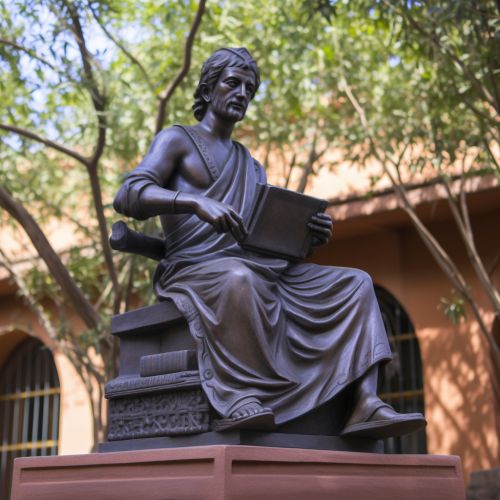Vyakarana
Introduction
Vyakarana (Sanskrit: व्याकरण) is one of the six ancient Vedangas, or auxiliary disciplines associated with the study of the Vedas, the sacred texts of Hinduism. The term Vyakarana itself translates to "analysis" or "explanation" and is related to the field of Sanskrit grammar, particularly the system of rules for sentence formation. The foundational text for this discipline is the Ashtadhyayi, written by the ancient scholar Panini.


Historical Context
Vyakarana is believed to have developed as a critical tool for the correct interpretation and understanding of Vedic texts, which were composed in an early form of Sanskrit. The precise origins of Vyakarana are difficult to trace, but it is generally accepted that the discipline was well established by the end of the Vedic period (1500-500 BCE). The earliest known Vyakarana treatises, such as the Nirukta of Yaska, focused on etymology and semantic analysis of words.
Panini and the Ashtadhyayi
The most significant work in Vyakarana is the Ashtadhyayi (Eight-Chapter Grammar), a treatise written by the ancient scholar Panini. Panini's work, which dates back to the 4th century BCE, is considered the first comprehensive system of descriptive grammar for Sanskrit. The Ashtadhyayi consists of 3,959 sutras or aphorisms, which are organized into eight chapters. These sutras describe the rules for Sanskrit phonology, morphology, and syntax.
Principles of Vyakarana
Vyakarana is not merely a study of the rules of grammar. It is a comprehensive system that encompasses phonetics, phonology, morphology, syntax, semantics, and pragmatics. The primary objective of Vyakarana is to provide a framework for the proper usage of words and formation of sentences in Sanskrit to ensure clarity and precision in communication.
Influence and Legacy
The principles of Vyakarana have had a profound influence on various aspects of Indian philosophy, literature, and linguistics. The discipline has also played a crucial role in the preservation and continuity of the Sanskrit language. Furthermore, the concepts and methodologies developed in Vyakarana have been adapted and applied in the grammatical study of other languages, both within and outside the Indian subcontinent.
